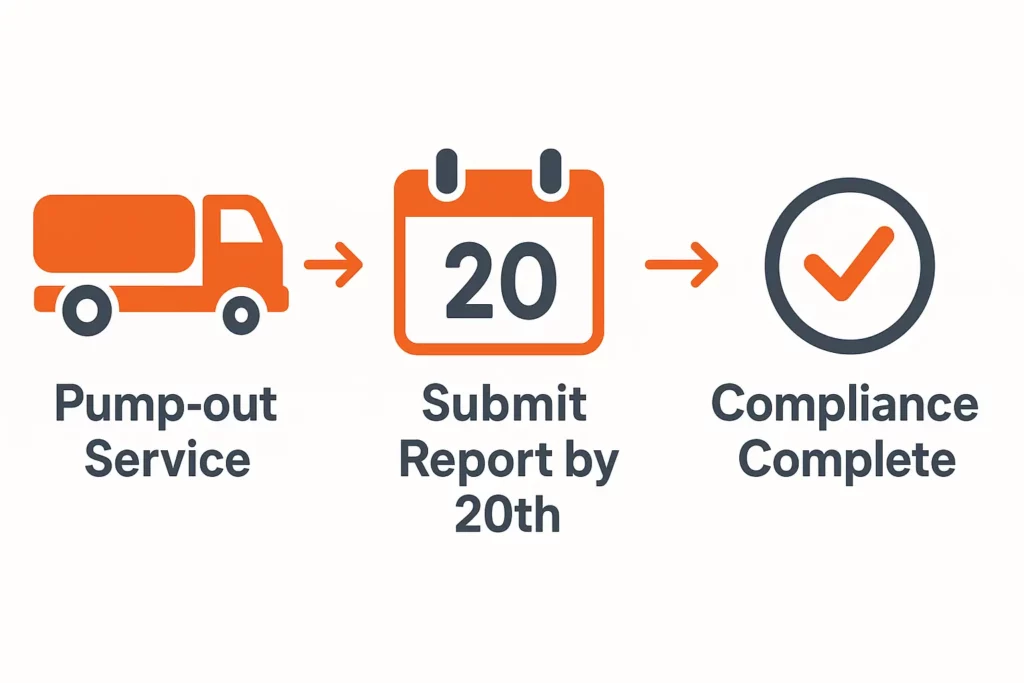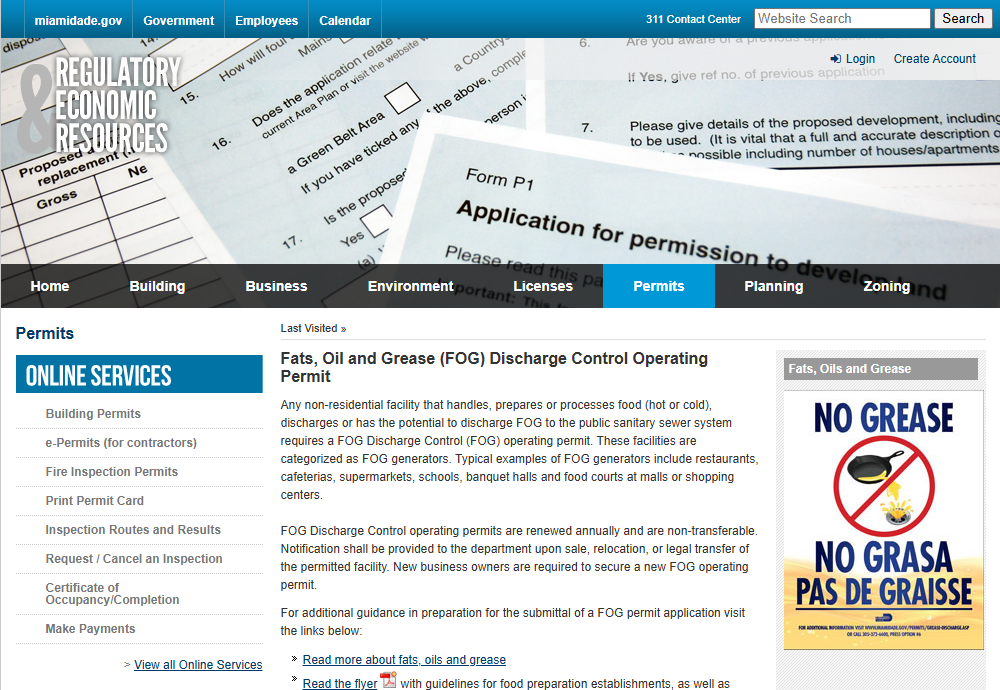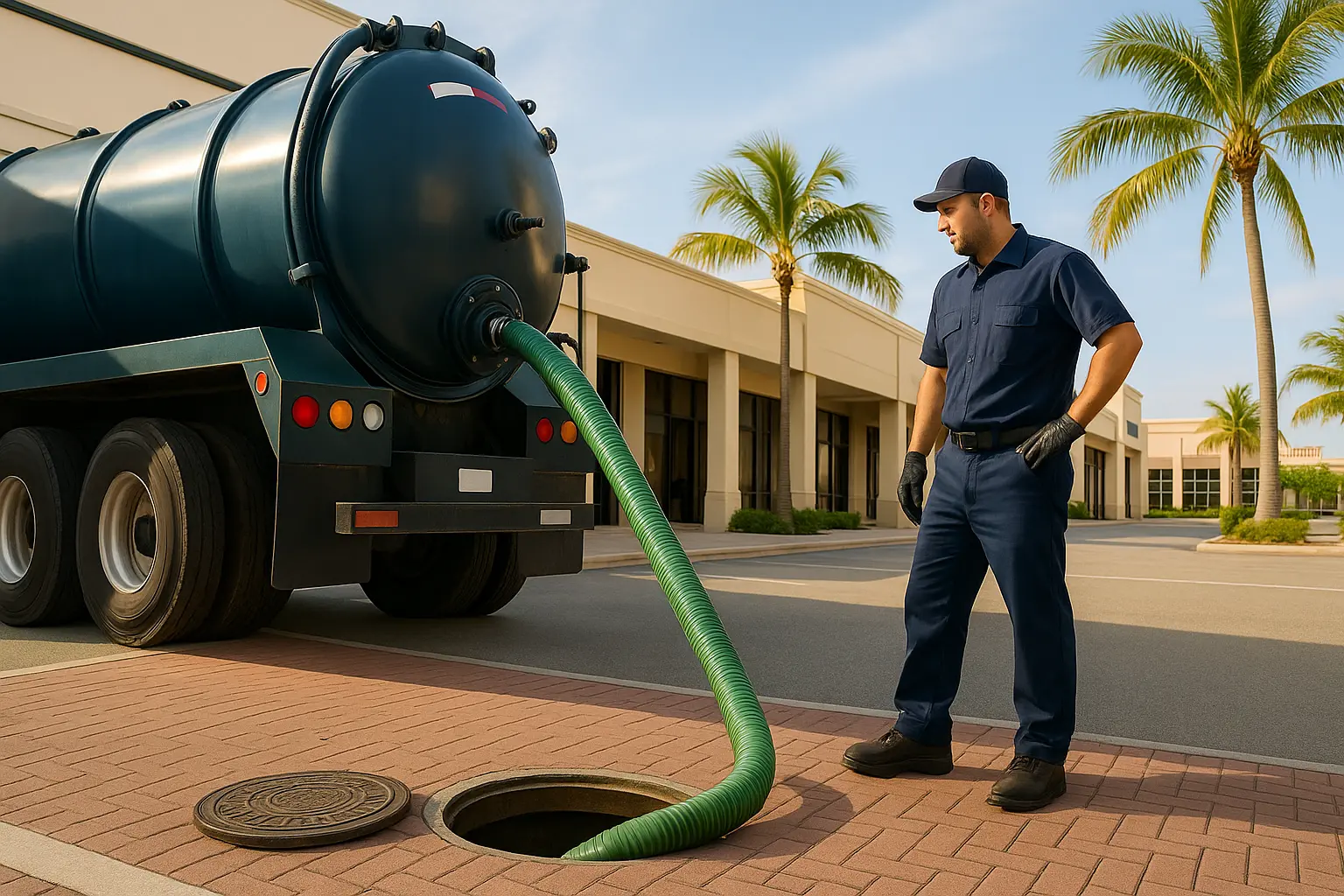Table of Contents
Why This Report Deserves Your Attention
Miami Dade’s sewer consent decree puts food businesses under intense scrutiny. Every grease trap pump out must be logged through the Grease Discharge Operating Report portal or you risk fines and forced shutdowns. DERM uses the data to prove the county is controlling FOG (fats, oils & grease) after repeated sewer overflows. Missing a single month can trigger an inspection letter, surcharge on your water bill and public records exposure that insurers notice. Treat the report as a “health check” for both the environment and your brand reputation, a small monthly habit that protects your entire operation.

Law & Permit Foundations
All rules trace back to Section 24 42.6 of the Miami Dade County Code, enacted after a 2018 federal court order. It mandates every non residential FOG generator, from cafés to school cafeterias, to obtain a Grease Discharge Operating (GDO) Permit and submit reports until the permit becomes void on December 31 each year. Renewal packets arrive 45 days before expiry, but the county expects proactive updates for ownership changes, system retrofits or menu expansions that affect grease output. Understanding this legal backbone helps you anticipate audits and align internal SOPs with the county’s enforcement playbook.
Who Must File & Key Definitions
Generator/Operator (GENOP) and Operator (OP) classes are the two most common permits. If your kitchen discharges anything with grease potential, think mop sinks, rotisserie drains, even soup kettles, you’re in scope. A “FOG control device” includes below ground interceptors over 750 gal, in kitchen traps as small as 20 GPM, or engineered separators tied to automated pump carts. Each device gets its own cleaning schedule, and each cleaning event produces a Liquid Waste Transporter Electronic Manifest that feeds the GDO Report. Shared commissaries and ghost kitchens must file separately for every brand sub tenant; auditors review cross referenced manifests to spot gaps.
Filing Calendar & Portal Snapshot
DERM’s online portal opens the day your trap is pumped and locks submissions on the 20th of the following month. The table below keeps your team on track:
| Deadline (all year) | Required Action |
|---|---|
| Pump out day | Collect hauler LW permit # & volume |
| 20th next month | Submit electronic manifest in portal |
The system demands Chrome or Edge, autofills your facility data, and auto timestamps the entry as legal proof. Keep the confirmation PDF (email + on screen) in a cloud folder; inspectors ask for it first.
Step by Step Electronic Submission

- Log in with your GDO permit ID and default password (changed at first use).
- Select hauler from the dropdown. Using a non permitted hauler prompts an instant rejection.
- Enter pump out date exactly as on the paper receipt; mismatched dates trigger audit flags.
- Preview → Accept → Submit. A green banner confirms acceptance.
- Download receipt PDF and email it to yourself and the GM for redundancy.
Self cleaning units ≤ 20 GPM follow the same portal but choose “Non Listed Transporter” and type SELF CLEANING as the hauler. Maintain a physical logbook for three years; DERM inspectors will compare it with digital entries.
https://www.miamidade.gov/permits/grease-discharge.asp
Common Violations & How to Dodge Them
The top citation is “Failure to report by the 20th,” followed by using enzyme additives, bypass piping or letting yellow grease bins leak onto pavement. Another sleeper violation: not labeling each interceptor on site diagrams, which hinders inspectors and inflates penalty tiers. People Plumbing’s field audits show many kitchens overlook capacity limits and cleaning frequency, assuming a large tank buys more time, wrong. Stick to the 25% rule (pump when FOG + solids hit a quarter of tank volume) and keep floor drains grease free to avoid surprise sampling fees.
Pro Level Maintenance & Recordkeeping
Schedule pump outs mid shift change to let staff witness the process and sign the hauler’s manifest; first hand awareness prevents forged dates. Photograph the empty interceptor for visual proof, then save shots alongside the PDF confirmation. Invest in a 140 gal rolling tank for indoor oil storage; its sealed lid minimizes spills and simplifies manifest volumes. Pair it with QR code labels linking to your digital logbook so night managers can verify compliance in seconds. Quarterly, audit your paper logs against the county portal to catch typos before DERM’s database crawl does. These small habits create an evidence trail that short circuits most disputes.
Resources, Contacts & Next Steps
Bookmark these official links: FOG Permit Application, Electronic Report Portal, and the Maintenance Log PDF for self cleaners. For real time clarifications, DERM’s Wastewater Section answers at (305) 372-6983, while the Environmental Permitting line (option 6) handles permit renewals. If you’re expanding or relocating, start the municipal Certificate of Use 60 days out to avoid permit gaps. Finally, subscribe to county push alerts; ordinance tweaks often arrive with little fanfare but heavy penalties. Staying connected keeps compliance simple and your kitchen humming.









